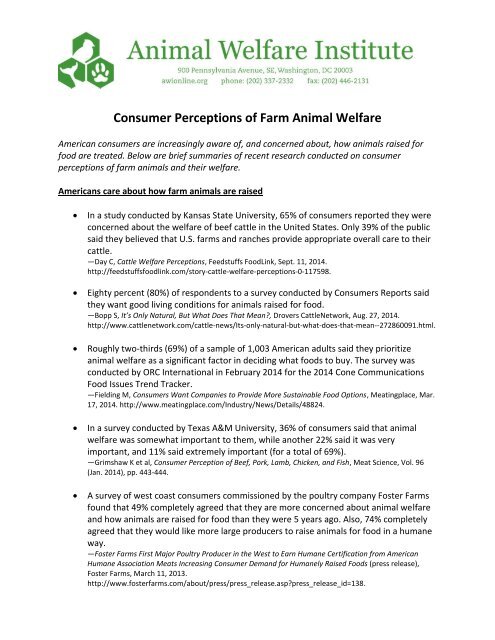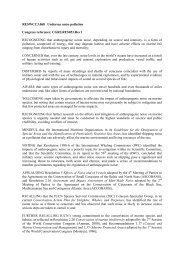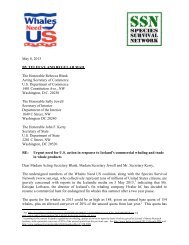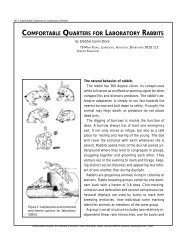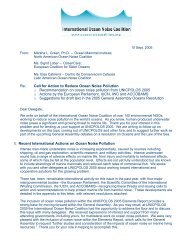Consumer Perceptions of Farm Animal Welfare
Consumer Perceptions of Farm Animal Welfare
Consumer Perceptions of Farm Animal Welfare
Create successful ePaper yourself
Turn your PDF publications into a flip-book with our unique Google optimized e-Paper software.
<strong>Consumer</strong> <strong>Perceptions</strong> <strong>of</strong> <strong>Farm</strong> <strong>Animal</strong> <strong>Welfare</strong><br />
American consumers are increasingly aware <strong>of</strong>, and concerned about, how animals raised for<br />
food are treated. Below are brief summaries <strong>of</strong> recent research conducted on consumer<br />
perceptions <strong>of</strong> farm animals and their welfare.<br />
Americans care about how farm animals are raised<br />
<br />
<br />
<br />
<br />
<br />
In a study conducted by Kansas State University, 65% <strong>of</strong> consumers reported they were<br />
concerned about the welfare <strong>of</strong> beef cattle in the United States. Only 39% <strong>of</strong> the public<br />
said they believed that U.S. farms and ranches provide appropriate overall care to their<br />
cattle.<br />
—Day C, Cattle <strong>Welfare</strong> <strong>Perceptions</strong>, Feedstuffs FoodLink, Sept. 11, 2014.<br />
http://feedstuffsfoodlink.com/story-cattle-welfare-perceptions-0-117598.<br />
Eighty percent (80%) <strong>of</strong> respondents to a survey conducted by <strong>Consumer</strong>s Reports said<br />
they want good living conditions for animals raised for food.<br />
—Bopp S, It’s Only Natural, But What Does That Mean?, Drovers CattleNetwork, Aug. 27, 2014.<br />
http://www.cattlenetwork.com/cattle-news/Its-only-natural-but-what-does-that-mean--272860091.html.<br />
Roughly two-thirds (69%) <strong>of</strong> a sample <strong>of</strong> 1,003 American adults said they prioritize<br />
animal welfare as a significant factor in deciding what foods to buy. The survey was<br />
conducted by ORC International in February 2014 for the 2014 Cone Communications<br />
Food Issues Trend Tracker.<br />
—Fielding M, <strong>Consumer</strong>s Want Companies to Provide More Sustainable Food Options, Meatingplace, Mar.<br />
17, 2014. http://www.meatingplace.com/Industry/News/Details/48824.<br />
In a survey conducted by Texas A&M University, 36% <strong>of</strong> consumers said that animal<br />
welfare was somewhat important to them, while another 22% said it was very<br />
important, and 11% said extremely important (for a total <strong>of</strong> 69%).<br />
—Grimshaw K et al, <strong>Consumer</strong> Perception <strong>of</strong> Beef, Pork, Lamb, Chicken, and Fish, Meat Science, Vol. 96<br />
(Jan. 2014), pp. 443-444.<br />
A survey <strong>of</strong> west coast consumers commissioned by the poultry company Foster <strong>Farm</strong>s<br />
found that 49% completely agreed that they are more concerned about animal welfare<br />
and how animals are raised for food than they were 5 years ago. Also, 74% completely<br />
agreed that they would like more large producers to raise animals for food in a humane<br />
way.<br />
—Foster <strong>Farm</strong>s First Major Poultry Producer in the West to Earn Humane Certification from American<br />
Humane Association Meats Increasing <strong>Consumer</strong> Demand for Humanely Raised Foods (press release),<br />
Foster <strong>Farm</strong>s, March 11, 2013.<br />
http://www.fosterfarms.com/about/press/press_release.asp?press_release_id=138.
In a survey conducted by the University <strong>of</strong> Nebraska, 70% <strong>of</strong> rural Nebraskans agreed or<br />
strongly agreed with the statement: “<strong>Animal</strong> welfare means more than providing<br />
adequate food, water and shelter; it also includes adequate exercise, space, and social<br />
activities for the animals.” Seventy percent <strong>of</strong> respondents thought that the welfare <strong>of</strong><br />
animals is better protected on family farms than on large, corporate farms, and 77%<br />
agreed or strongly agreed that food safety is largely dependent on the care farm animals<br />
receive.<br />
—Vogt R et al, <strong>Animal</strong> <strong>Welfare</strong>: <strong>Perceptions</strong> <strong>of</strong> Nonmetropolitan Nebraskans, University <strong>of</strong> Nebraska—<br />
Lincoln, Center for Applied Rural Innovation, July 2011.<br />
Technomic’s food industry trend tracking survey has documented that humane animal<br />
treatment is <strong>of</strong> increasing importance to consumers, with more than 50% now saying<br />
this is an important issue to them.<br />
—Center <strong>of</strong> the Plate: Poultry <strong>Consumer</strong> Trend Report, Technomic, May 2011.<br />
http://www.technomic.com/Reports_and_Newsletters/<strong>Consumer</strong>_Trend_Reports/dyn_PubLoad.php?pID<br />
=21.<br />
In an aided question, consumers responding to a survey conducted for Demeter<br />
Communications’ SegmenTrak study were asked to consider what they would like to<br />
know from farmers about food production that they currently do not know. More than<br />
two-thirds (68%) indicated they wanted to know more about ways farmers “ensure<br />
animal care.”<br />
—What “Indicator <strong>Consumer</strong>s” Want to Know Most About How U.S. Foods are Produced, Demeter<br />
Communications, Apr. 2010. http://demetercommunications/com/wpcontent/uploads/2011/05FINAL.Demeter.SegemenTrak.Full_Report.June2010.pdf.<br />
<strong>Animal</strong> welfare was cited as an issue <strong>of</strong> concern by a majority <strong>of</strong> respondents to a survey<br />
on restaurant social responsibility conducted in 2007. It was noted that animal welfare<br />
was the highest rated food-related issue, above locally-sourced foods and the <strong>of</strong>fering<br />
<strong>of</strong> organic foods.<br />
—Market Brief: Tracking and Interpreting Chain Restaurant Trends, Technomic Inc., July 2007.<br />
http://www.customerconnectireland.com/resources/amexMarketbrief_9-07%5B1%5D%20Copy.pdf.<br />
Ninety-five percent <strong>of</strong> respondents to a nationwide telephone survey conducted by<br />
Oklahoma State University agreed with the statement, “It is important to me that<br />
animals on farms are well cared for.”<br />
—Prickett RW et al, <strong>Consumer</strong> <strong>Perceptions</strong> for <strong>Farm</strong> <strong>Animal</strong> <strong>Welfare</strong>: Results <strong>of</strong> a Nationwide Telephone<br />
Survey, Oklahoma State University, Department <strong>of</strong> Agricultural Economics, 2007.<br />
http://asp.okstate.edu/baileynorwood/Survey4/files/InitialReporttoAFB.pdf.<br />
In a 2004 survey conducted by researchers at The Ohio State University, 92% <strong>of</strong> Ohioans<br />
agreed that it is important that farm animals are well-cared for, and 81% said the wellbeing<br />
<strong>of</strong> farm animals is just as important as the well-being <strong>of</strong> pets.<br />
—Rauch A & Sharp JS, Ohioans Attitudes about <strong>Animal</strong> <strong>Welfare</strong>, The Ohio State University, Social<br />
Responsibility Initiative, January 2005. http://ohiosurvey.osu.edu/pdf/2004_<strong>Animal</strong>_report.pdf.<br />
<strong>Animal</strong> <strong>Welfare</strong> Institute <strong>Consumer</strong> <strong>Perceptions</strong> <strong>of</strong> <strong>Farm</strong> <strong>Animal</strong> <strong>Welfare</strong> Page 2
<strong>Consumer</strong>s support regulating farm animal care<br />
<br />
<br />
<br />
<br />
Research on mandatory labeling <strong>of</strong> animal welfare practices, conducted by university<br />
pr<strong>of</strong>essors from Kansas State University and Michigan State University, found that<br />
61.7% <strong>of</strong> survey respondents favored mandatory labeling <strong>of</strong> pork produced on farms<br />
using gestation crates, and 62.0% said they supported mandatory labeling <strong>of</strong> eggs<br />
produced using cages for laying hens. The researchers estimated that the typical U.S.<br />
shopper was willing to pay 20% higher prices for pork and egg products to obtain this<br />
type <strong>of</strong> mandatory labeling information.<br />
—Tonsor GT & Wolf CA, Mandatory Labeling <strong>of</strong> <strong>Animal</strong> <strong>Welfare</strong> Attributes, Kansas State University,<br />
Department <strong>of</strong> Agricultural Economics, July 2011.<br />
http://www.agmanager.info/livestock/marketing/animalwelfare/AW-Labeling_FactSheet_07-19-11.pdf.<br />
In a survey conducted by agricultural economists at Oklahoma State University,<br />
approximately half <strong>of</strong> the respondents said they believe government should “force all<br />
food companies to indicate the level <strong>of</strong> animal care on their product labels.” More than<br />
half <strong>of</strong> the respondents said companies should be allowed to label their food “animal<br />
compassionate” if they adhere to high welfare standards. Also, <strong>of</strong> those with an opinion,<br />
69% favored governmental bans on eggs produced under lower standards <strong>of</strong> animal<br />
care, even if they could easily find egg products that met their personal standards <strong>of</strong><br />
care.<br />
—Norwood FB & Lusk JL, Compassion by the Pound: The Economics <strong>of</strong> <strong>Farm</strong> <strong>Animal</strong> <strong>Welfare</strong>, Oxford<br />
University Press, 2011, pp. 341-343.<br />
The welfare and protection <strong>of</strong> animals raised for food was seen as very or somewhat<br />
important by 79% <strong>of</strong> respondents to a survey managed by the Humane Research Council<br />
in June 2008. A large majority (73%) would support a law requiring that farm animals,<br />
including pigs, cows and chickens, are provided with enough space to behave naturally.<br />
—<strong>Animal</strong> Tracker – Wave 1, An HRC-Managed Research Study, Humane Research Council, June 2008.<br />
http://www.humanespot.org.<br />
Fifty-eight percent <strong>of</strong> Americans said they were very or somewhat concerned about the<br />
treatment <strong>of</strong> farm animals in a 2003 poll by Zogby International. Enacting laws to<br />
protect farm animals from cruelty was supported by 82% <strong>of</strong> those surveyed.<br />
—Nationwide Views on the Treatment <strong>of</strong> <strong>Farm</strong> <strong>Animal</strong>s, Zogby International for the <strong>Animal</strong> <strong>Welfare</strong> Trust,<br />
2003. http://civileats.com/wp-content/uploads/2009/09/AWT-final-poll-report-10-22.pdf.<br />
“Humanely raised” is an important food claim<br />
<br />
A public opinion survey conducted by Edge Research for the American Society for the<br />
Prevention <strong>of</strong> Cruelty to <strong>Animal</strong>s (ASPCA) found that more than 80% <strong>of</strong> respondents fell<br />
it’s important that the chicken they eat is humanely raised. Yet less than a third <strong>of</strong><br />
respondents trust the companies that make chicken products to treat their chickens in a<br />
humane manner. More than 75% <strong>of</strong> chicken consumers said they would like more<br />
humanely-raised chicken options at their local grocery stores.<br />
—Treat My Chicken Right: ASPCA Survey Shows <strong>Consumer</strong>s Want More Humanely Raised Chicken, Feel it<br />
Leads to Safer Chicken Products (press release), ASPCA, Sept. 2, 2014. http://www.aspca.org/aboutus/press-releases/treat-my-chicken-right-aspca-survey-shows-consumers-want-more-humanely.<br />
<strong>Animal</strong> <strong>Welfare</strong> Institute <strong>Consumer</strong> <strong>Perceptions</strong> <strong>of</strong> <strong>Farm</strong> <strong>Animal</strong> <strong>Welfare</strong> Page 3
In a survey conducted for the <strong>Animal</strong> <strong>Welfare</strong> Institute, 86% <strong>of</strong> respondents said the<br />
government should require meat and poultry producers to prove claims like “humanely<br />
raised” and that the claims should not be allowed on product labels unless they have<br />
been verified by an independent third party. Also, 86% <strong>of</strong> respondents to the survey<br />
agreed with the statement, “Producers should not be allowed to use the claim<br />
‘humanely raised’ on their product labels unless they exceed minimum industry animal<br />
care standards.”<br />
—<strong>Animal</strong> <strong>Welfare</strong> Institute, Oct. 2013. (Available from AWI upon request.)<br />
The label claim “humanely raised” was ranked as the highest in importance over<br />
“organic,” “natural,” and “antibiotic free” among respondents to the 2013 Humane<br />
Heartland <strong>Farm</strong> <strong>Animal</strong> <strong>Welfare</strong> Survey conducted by American Humane. Ninety-five<br />
percent <strong>of</strong> the respondents indicated that a humanely raised certified label signified<br />
“better treatment <strong>of</strong> animals.”<br />
—Humane Heartland <strong>Farm</strong> <strong>Animal</strong> <strong>Welfare</strong> Survey, American Humane Association, 2013,<br />
http://www.americanhumane.org/assets/humane-assets/humane-heartland-farm-animals-surveyresults.pdf.<br />
In a survey <strong>of</strong> west coast consumers commissioned by the poultry company Foster<br />
<strong>Farm</strong>s, 74% <strong>of</strong> respondents completely agreed that humane-certified foods should be<br />
more widely available for consumers.<br />
—Foster <strong>Farm</strong>s First Major Poultry Producer in the West to Earn Humane Certification from American<br />
Humane Association Meats Increasing <strong>Consumer</strong> Demand for Humanely Raised Foods (press release),<br />
Foster <strong>Farm</strong>s, March 11, 2013.<br />
http://www.fosterfarms.com/about/press/press_release.asp?press_release_id=138.<br />
An overwhelming majority (91%) <strong>of</strong> consumers <strong>of</strong> Just Bare chicken said third-party<br />
humane certification <strong>of</strong> animal products is extremely or very important in an October<br />
2010 survey. When these consumers were asked about how much trust they place in<br />
various levels <strong>of</strong> animal welfare claims, nearly two-thirds (62%) said they placed a high<br />
degree <strong>of</strong> trust in certification by a third-party animal welfare organization. Far fewer<br />
consumers indicated trust in certification by a government or industry association or<br />
trust in a company’s own records.<br />
—Common Questions, Just Bare Chicken, Sept. 12, 2012. http://www.justbarechicken.com/faqs.cfm.<br />
In a survey on the welfare <strong>of</strong> chickens raised for meat commissioned by the <strong>Animal</strong><br />
<strong>Welfare</strong> Institute, 70% <strong>of</strong> all respondents, and 77% <strong>of</strong> frequent chicken meat shoppers,<br />
indicated they thought the claim “humanely raised” on a package <strong>of</strong> chicken meant that<br />
the animal was raised under a standard <strong>of</strong> care better than typical industry practice.<br />
—U.S. Poll on the <strong>Welfare</strong> <strong>of</strong> Chickens Raised for Meat, <strong>Animal</strong> <strong>Welfare</strong> Institute, April 2010.<br />
http://awionline.org/sites/default/files/uploads/legacy-uploads/documents/FA-<br />
HumanelyRaisedCagedFreeSurvey-081110-1281725036-document-23248.pdf.<br />
Fifty-one percent <strong>of</strong> consumers said the claim “humanely raised” was very important or<br />
important in causing them to believe a food is ethically produced. Of the 29 food claims<br />
<strong>Animal</strong> <strong>Welfare</strong> Institute <strong>Consumer</strong> <strong>Perceptions</strong> <strong>of</strong> <strong>Farm</strong> <strong>Animal</strong> <strong>Welfare</strong> Page 4
studied, “humanely raised” ranked fourth highest, above “no antibiotics,” “produced in<br />
the USA,” “natural,” and “sustainably produced.”<br />
—Ethical Food: A Research Report on the Ethical Claims that Matter Most to Food Shoppers and How<br />
Ethical Concerns Influence Food Purchases, Context Marketing, March 2010.<br />
http://www.contextmarketing.com/sources/feb28-2010/ethicalfoodreport.pdf.<br />
<br />
<br />
<br />
<br />
<br />
<br />
When asked to identify their top three reasons for purchasing “natural” or “organic”<br />
meat, 38% <strong>of</strong> respondents to an online poll conducted by the American Meat Institute<br />
and the Food Marketing Institute chose “better health and treatment <strong>of</strong> the animal.”<br />
<strong>Animal</strong> treatment ranked third highest among nine meat selection criteria, above<br />
“freshness,” “better taste,” and “environmental impact.”<br />
—Top 3 Reasons for Purchasing Natural or Organic Meat, Beyond the <strong>Farm</strong> Gate, Whole Foods Market,<br />
Issue 4, June 2010.<br />
In a national poll conducted by Harris Interactive for the World Society for the<br />
Protection <strong>of</strong> <strong>Animal</strong>s, 58% <strong>of</strong> respondents indicated it is important to them to be able<br />
to purchase humanely labeled meat and eggs in their local supermarket, and<br />
approximately one-quarter <strong>of</strong> the sample said they had bought “organic” or “free range”<br />
animal products in the previous year.<br />
—Finding <strong>Animal</strong> Friendly Food: The Availability <strong>of</strong> Humanely Labeled Foods in U.S. Grocery Stores, World<br />
Society for the Protection <strong>of</strong> <strong>Animal</strong>s, Boston, MA, 2009.<br />
In a survey conducted for the International Dairy-Deli-Bakery Association, 55% <strong>of</strong><br />
American consumers who were aware <strong>of</strong> the “humane treatment” food claim felt that<br />
the claim was very or somewhat important. Of 19 claims studied, only two (“locally<br />
raised or grown” and “antioxidants”) were seen by aware shoppers as being more<br />
important than “humane treatment certified.”<br />
—Health & Wellness: The Purpose-Driven <strong>Consumer</strong> (Executive Summary), International Dairy-Deli-Bakery<br />
Association.<br />
<strong>Consumer</strong>s responding to a 2007 Public Opinion Strategies survey ranked the “humanely<br />
raised” label as the most important food label, over “organic” and “natural.”<br />
—Frequently Asked Questions, The Humane Touch, American Humane Association.<br />
http://humaneheartland.org/faqs.<br />
Of more than 1,000 respondents to a 2007 Oklahoma State University survey, 52% said<br />
personal food choices have a large impact on the well-being <strong>of</strong> farm animals, and 49%<br />
said they consider the well-being <strong>of</strong> farm animals when they make food purchasing<br />
decisions.<br />
—Prickett RW et al, <strong>Consumer</strong> <strong>Perceptions</strong> for <strong>Farm</strong> <strong>Animal</strong> <strong>Welfare</strong>: Results <strong>of</strong> a Nationwide Telephone<br />
Survey, Oklahoma State University, Department <strong>of</strong> Agricultural Economics, 2007.<br />
http://asp.okstate.edu/baileynorwood/Survey4/files/InitialReporttoAFB.pdf.<br />
In a 2005 survey <strong>of</strong> Michigan residents conducted by researchers at Michigan State<br />
University, 92% <strong>of</strong> respondents rated “humane animal treatment” as “very important”<br />
or “somewhat important” as a factor when purchasing animal products. Humane<br />
treatment was rated as significantly more important than factors having to do with<br />
where the animal was raised or by whom.<br />
<strong>Animal</strong> <strong>Welfare</strong> Institute <strong>Consumer</strong> <strong>Perceptions</strong> <strong>of</strong> <strong>Farm</strong> <strong>Animal</strong> <strong>Welfare</strong> Page 5
—Conner DS et al, <strong>Consumer</strong> Preferences for Pasture-Raised <strong>Animal</strong> Products: Results from Michigan,<br />
Journal <strong>of</strong> Food Distribution Research, July 2008, pp. 12-25.<br />
<br />
When University <strong>of</strong> California, Santa Cruz, researchers asked central California shoppers<br />
to evaluate five potential food label claims, “humane” was most <strong>of</strong>ten the top-ranked<br />
choice, above “locally grown,” “living wage,” “U.S. grown,” and “small-scale farm.”<br />
Product labels were a preferred source <strong>of</strong> food information for 81% <strong>of</strong> the consumers.<br />
—What Do People Want to Know About Their Food?, University <strong>of</strong> California, Santa Cruz, Research Brief<br />
#5, Winter 2005. http://escholarship.org/uc/item/75s222dm.<br />
<strong>Consumer</strong>s are willing to pay more for food that is “humanely raised”<br />
<br />
<br />
<br />
<br />
<br />
<br />
When asked, “what is the most you are willing to pay for high quality, humanely raised<br />
products,” 34% <strong>of</strong> respondents to a 2013 survey conducted by American Humane said<br />
10-20% more, while 28% <strong>of</strong> respondents said they would pay 20-30% more.<br />
—Humane Heartland <strong>Farm</strong> <strong>Animal</strong> <strong>Welfare</strong> Survey, American Humane Association, 2013,<br />
http://www.americanhumane.org/assets/humane-assets/humane-heartland-farm-animals-surveyresults.pdf.<br />
In a survey <strong>of</strong> poultry consumers conducted by Technomic, 38% indicated they are more<br />
likely to purchase and be willing to pay more for “humane” meats. Thirty-seven percent<br />
were more likely to purchase and pay more “organic” meats.<br />
—Custom Poultry <strong>Consumer</strong> Survey, Technomic, Sept. 2012.<br />
One in four (24%) <strong>of</strong> respondents to a consumer survey commissioned by Whole Foods<br />
Market said they are willing to pay more for meats from animals raised under humane<br />
animal husbandry standards.<br />
—Americans Willing to Pay More for Food Without Artificial Ingredients, Meats Without Antibiotics/Added<br />
Growth Hormones (press release), Whole Foods Market, Sept. 27, 2012.<br />
http://media.wholefoodsmarket.com/.<br />
Fifty-seven percent <strong>of</strong> consumers responding to a Context Marketing survey said they<br />
would be willing to pay 1% to 10% more “for food that promises to be produced to<br />
higher ethical standards.” Twelve percent were willing to pay 10% more.<br />
—Ethical Food: A Research Report on the Ethical Claims that Matter Most to Food Shoppers and How<br />
Ethical Concerns Influence Food Purchases, Context Marketing, March 2010.<br />
http://www.contextmarketing.com/sources/feb28-2010/ethicalfoodreport.pdf.<br />
A 2007 survey by Public Opinion Strategies found that 58% <strong>of</strong> consumers would spend<br />
an additional 10% or more for meat, poultry, eggs, or dairy products labeled as<br />
“humanely raised.”<br />
—Frequently Asked Questions, The Humane Touch, American Humane Association.<br />
http://humaneheartland.org/faqs.<br />
In a survey by The Ohio State University, 59% <strong>of</strong> Ohioans said they would be willing to<br />
pay more for meat, poultry, or dairy labeled as coming from humanely treated animals.<br />
Among those, 43% said they would pay 10% more, and 12% said they would pay 25%<br />
more.<br />
<strong>Animal</strong> <strong>Welfare</strong> Institute <strong>Consumer</strong> <strong>Perceptions</strong> <strong>of</strong> <strong>Farm</strong> <strong>Animal</strong> <strong>Welfare</strong> Page 6
—Rauch A & Sharp JS, Ohioans Attitudes about <strong>Animal</strong> <strong>Welfare</strong>, The Ohio State University, Social<br />
Responsibility Initiative, January 2005. http://ohiosurvey.osu.edu/pdf/2004_<strong>Animal</strong>_report.pdf.<br />
<strong>Consumer</strong> surveys by the <strong>Animal</strong> Agriculture Alliance in 1993, 1998, and 2004<br />
demonstrated that American shoppers are willing to pay more for food labeled<br />
“humanely raised.” In 2004, 31% <strong>of</strong> respondents were willing to pay 5% more, while<br />
23% were willing to pay 10% more.<br />
—<strong>Consumer</strong> Attitudes about <strong>Animal</strong> <strong>Welfare</strong>: 2004 National Public Opinion Survey, <strong>Animal</strong> Agriculture<br />
Alliance and National Corn Growers Association, April 2004.<br />
http://www.animalagalliance.org/images/ag_insert/2004_Pub_Op_PR.ppt.<br />
<br />
<br />
Eighty-one percent <strong>of</strong> U.S. respondents to a Zogby International poll would be willing to<br />
pay more for eggs from chickens raised in a humane manner.<br />
—U.S. Public Supports Humane Treatment for Hens, Zogby International for <strong>Farm</strong> Sanctuary, September<br />
2000. http://www.isecruelty.com/poll.php.<br />
Forty-four percent <strong>of</strong> a sample <strong>of</strong> 1,000 Americans, surveyed in 1998, said they would<br />
try a “humanely raised” product if the cost was 5% more, while 20% would try the<br />
product if it was 10% more.<br />
—American Attitudes towards <strong>Farm</strong>ers and <strong>Farm</strong> <strong>Animal</strong> Issues, Opinion Dynamics for the <strong>Animal</strong> Industry<br />
Foundation, Arlington, VA, 1998.<br />
Certain food labels confuse and mislead shoppers<br />
<br />
<br />
<br />
A large majority <strong>of</strong> respondents to a survey conducted by <strong>Consumer</strong> Reports incorrectly<br />
identified the meaning <strong>of</strong> the claim “natural” when used on meat and poultry products:<br />
89% believed the claim indicated the animals did not receive growth hormones; 81%<br />
said no antibiotics or other drugs; and 85% said the animals’ feed did not contain<br />
genetically engineered organisms. None <strong>of</strong> these criteria are present in USDA’s current<br />
definition <strong>of</strong> the claim.<br />
—Bopp S, It’s Only Natural, But What Does That Mean?, Drovers CattleNetwork, Aug. 27, 2014.<br />
http://www.cattlenetwork.com/cattle-news/Its-only-natural-but-what-does-that-mean--272860091.html.<br />
In a survey commissioned by <strong>Consumer</strong> Reports, a large majority <strong>of</strong> respondents<br />
exhibited false expectations <strong>of</strong> the claim “humanely raised.” For example: 92% <strong>of</strong><br />
consumers said the claim should mean the farm was inspected to verify the claim; 90%<br />
said the term should mean the animals had adequate living space; 88% said the term<br />
should mean animals were humanely slaughtered; and 79% said the claim should mean<br />
the animals went outdoors—none <strong>of</strong> which are necessarily true, as USDA has no<br />
definition for the claim and allows producers to determine what the claim means to<br />
them.<br />
—Survey Reveals <strong>Consumer</strong>s Have Different Expectations for ‘Natural’ Food Products, MeatPoultry.com,<br />
June 16, 2014.<br />
http://www.meatpoultry.com/articles/news_home/Trends/2014/06/<strong>Consumer</strong>_Reports_aims_to_ban_n.<br />
aspx?ID=%7BC49A9FD4-0039-4C4A-B9F3-F45492ECE987%7D.<br />
In a survey commissioned by CommonGround, more than half <strong>of</strong> moms agreed it is<br />
important to feed their families “hormone-free” poultry and pork even though it may<br />
<strong>Animal</strong> <strong>Welfare</strong> Institute <strong>Consumer</strong> <strong>Perceptions</strong> <strong>of</strong> <strong>Farm</strong> <strong>Animal</strong> <strong>Welfare</strong> Page 7
cost more to do so. But in fact, USDA prohibits the use <strong>of</strong> hormones to raise chickens<br />
and pigs, and consequently there is no value to paying more for “hormone-free” labeled<br />
pork or chicken products.<br />
—Know Before You Buy: 5 Things Moms Get Wrong at the Grocery Stores, CommonGround,<br />
http://www.findourcommonground.com.<br />
<br />
<br />
<br />
<br />
More than half (53%) <strong>of</strong> moms surveyed by CommonGround agreed it is important to<br />
purchase food labeled “all natural,” whenever possible because it is a more nutritious<br />
choice for their family. However, the natural label does not include any standards<br />
regarding farm practices or the nutritional content <strong>of</strong> food.<br />
—Know Before You Buy: 5 Things Moms Get Wrong at the Grocery Stores, CommonGround,<br />
http://www.findourcommonground.com.<br />
Only two percent <strong>of</strong> more than 2,000 Americans responding to a Harris Interactive Poll<br />
conducted for the <strong>Animal</strong> <strong>Welfare</strong> Institute were able to correctly identify the definition<br />
<strong>of</strong> “natural” when used on meat and poultry. Fifty-one percent mistakenly thought<br />
“natural” meant the product came from animals who were not administered hormones<br />
or antibiotics. (The “natural” claim indicates a product is minimally processed and has<br />
no artificial ingredients; the claim has no relevance to how the animals were raised or<br />
treated.) Seventy-one percent <strong>of</strong> the sample strongly or somewhat agreed that having<br />
both a “natural” and a “naturally-raised” label, where the labels have different<br />
meanings, could be confusing to consumers.<br />
—Natural Labeling Poll, Harris Interactive QuickQuery for the <strong>Animal</strong> <strong>Welfare</strong> Institute, October 2009.<br />
When <strong>Consumer</strong> Reports asked what consumers thought a “naturally raised” label on a<br />
meat product should mean, 85% said that the product came from an animal raised in a<br />
natural environment, 77% said it came from an animal that had access to the outdoors,<br />
and 76% said the label meant the animal had been treated humanely. (“Naturally<br />
raised” actually means the animal was not given antibiotics or hormones and was fed a<br />
vegetarian diet. The claim does not describe the housing or treatment <strong>of</strong> animals.)<br />
—Food-Labeling Poll 2008, <strong>Consumer</strong> Reports, November 2008.<br />
http://www.greenerchoices.org/pdf/foodpoll2008.pdf.<br />
Eighty-three percent <strong>of</strong> respondents to a 2007 food labeling poll by <strong>Consumer</strong> Reports<br />
said that the “natural” label on meat should mean “it came from an animal that was<br />
raised in a natural environment.”<br />
—Food Labeling Poll, <strong>Consumer</strong> Reports, July 2007.<br />
http://greenerchoices.org/pdf/Food%20Labeling%20Poll-final_rev.pdf.<br />
(9/14)<br />
<strong>Animal</strong> <strong>Welfare</strong> Institute <strong>Consumer</strong> <strong>Perceptions</strong> <strong>of</strong> <strong>Farm</strong> <strong>Animal</strong> <strong>Welfare</strong> Page 8


